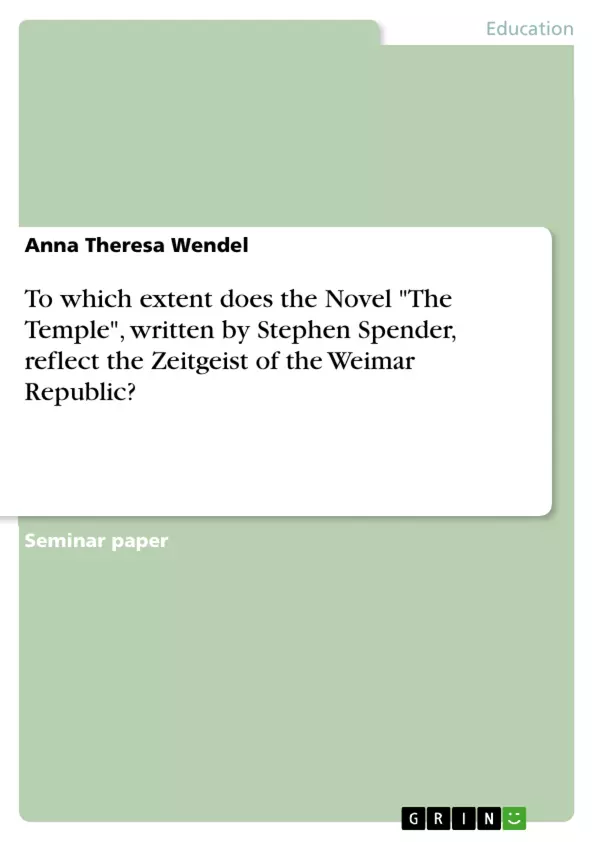The story The Temple written by Stephen Spender in 1929 is acting around the protagonist Paul Schoner, a 20 year old English student visiting a friend in Hamburg. He is also the focalizer of the novel and the reader experiences everything through his eyes, so he rather submits a subjective point of view. Nevertheless, the novel delivers a lot of impressions about the Weimar era and the spirit of that time, because Spender always “wrote poetry which derived its inspiration from the social, economic and political conditions of the day” (Pandey, p.3).
Inhaltsverzeichnis (Table of Contents)
- Introduction
- Climate of the Thirties in Germany
- The Queers in the Weimar Era
- The Lifestyle during that Era
- The Handling of Sexuality
- The Spirit of the Time through Joachim's Eyes
- Description of the Social Attitudes
- The Representation of two States in the Novel
- The Political Changes in Germany in 1932
- Conclusion
Zielsetzung und Themenschwerpunkte (Objectives and Key Themes)
This essay aims to analyze Stephen Spender's novel The Temple and assess how effectively it reflects the Zeitgeist of the Weimar Republic. The essay will examine the novel's portrayal of the social and political climate of the 1930s in Germany, particularly focusing on the experiences of gay characters and the cultural changes of the era.
- The cultural and social changes of the Weimar Republic, particularly the rise of a more liberal attitude towards certain marginalized groups.
- The portrayal of homosexuality in the novel and its connection to the broader societal context of the Weimar era.
- The contrasting social attitudes and experiences of British and German characters in the novel.
- The influence of political events and social changes on the lives of individuals, particularly the impact of the political shifts in 1932.
Zusammenfassung der Kapitel (Chapter Summaries)
The essay begins with an overview of the historical context of the 1930s in Germany, highlighting the cultural and social achievements of the Weimar Republic and the emergence of more liberal attitudes towards marginalized groups such as homosexuals. This sets the stage for examining how the novel depicts the social climate of the time.
The essay then delves into the portrayal of homosexuality within the novel, focusing on the experiences of the main characters and exploring how their sexual orientation shapes their interactions and perceptions of the world. The analysis will likely draw connections between the characters' experiences and the broader social and political context of the Weimar era.
Furthermore, the essay will analyze the contrasting social attitudes and experiences of British and German characters in the novel, potentially highlighting the tensions and cultural differences that existed between the two countries during this period.
Schlüsselwörter (Keywords)
The key terms and concepts explored in this essay include: Weimar Republic, Zeitgeist, homosexuality, cultural change, social attitudes, British and German youth, political change, 1930s Germany, The Temple, Stephen Spender.
Frequently Asked Questions
How does "The Temple" reflect the Weimar Republic?
The novel captures the social, economic, and political conditions of the era through the eyes of its English protagonist, Paul Schoner.
What is the portrayal of homosexuality in the novel?
It reflects the more liberal attitudes toward queer life that emerged during the Weimar era before the political shifts of the early 1930s.
Who is the protagonist of Spender's "The Temple"?
The protagonist is Paul Schoner, a 20-year-old English student visiting Hamburg.
What political changes are addressed in the essay?
The essay discusses the transition from the liberal Weimar era to the political changes in Germany around 1932.
What is the significance of the "Zeitgeist" in this study?
The study assesses how literature can serve as a subjective but informative record of the spirit of the time (Zeitgeist) in German history.
- Arbeit zitieren
- Anna Theresa Wendel (Autor:in), 2011, To which extent does the Novel "The Temple", written by Stephen Spender, reflect the Zeitgeist of the Weimar Republic?, München, GRIN Verlag, https://www.grin.com/document/208471



